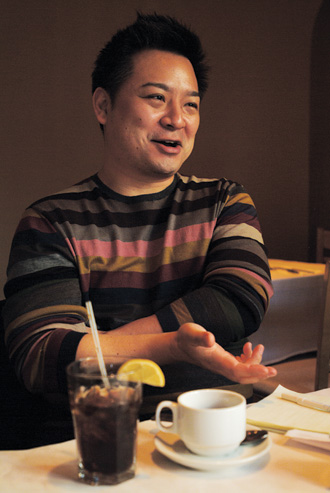By Corina Knoll
Photograph by Eric Sueyoshi
He can’t bend space and time like his best friend Hiro, and even though he’s pretty much relegated to the role of sidekick, Ando Masahashi has a lot to do with saving the world. Since leaving their desk jobs in Tokyo, Ando and Hiro (who discovered he can teleport) have been running from mobsters and stealing swords, all in the name of changing a future that includes the bombing of New York. While Hiro is the one with the superpower, it has become clear that both men are destined to become “Heroes.”
“The writers really love writing for our storyline,” says James Kyson Lee, 31, who portrays Ando, the wide-eyed companion on the NBC hit series. “They’ve created this sort of modern-day odd couple. They call us the new Dean Martin/Jerry Lewis combo.”
The two characters speak primarily in Japanese (with subtitles), which makes for plenty of fish-out-of-water scenarios, with Lee playing Lewis to Hiro’s Martin, especially when he’s trying to impress women.
“He seems to wear his heart on his sleeve,” says “Heroes” writer Joe Pokaski of Lee. “You get his emotions on his face. He has really amazing comic timing and can be funny and heartbreaking at the same time.”
While the first season will come to a close this month, “Heroes” will return in the fall, and Lee has already been signed on as a series regular.
It’s a moment of stability that the East Coast native savors, considering his first night in Los Angeles was spent in his rental car. At 25, he arrived from Boston on a one-way ticket, with scant knowledge of the city and little cash in his wallet.
“I was going to go to a hostel in Venice, but when I got there the vibe was really weird,” Lee remembers. “It was already night. I was driving and I ended up in some parking lot of a big mall. I was tired from the flight so I fell asleep.”
More than five years later, Lee is sitting in a sushi dive just across the street from Sunset Gower studios, where “Heroes” is filmed. Dressed in a casual button-down shirt and jeans, the clean-cut Lee is animated and cheerful. In between slurps of udon, he talks about his days studying theater at Los Angeles City College.
“Because it was part of a city college, it was under city-college tuition — it was the cheapest conservatory style you could get,” he says. “It wasn’t Juilliard, but you got what you put into it.
“I felt like 20 years of creativity just becoming unleashed, like whooooosh! For the first time, I felt like I’m where I’m supposed to be.”
Born in Seoul, then raised in Changwon, Lee didn’t arrive in the States until he was 10. He and his parents moved to New York to live with family who had already immigrated. At one point, there were a dozen people living in the same house.
Lee attended the Bronx High School of Science and played handball and ultimate Frisbee. He left for Boston University to study communications, but then transferred to the nearby but much smaller New England Institute of Art. Around that time, a friend invited him to participate in an improv group. While Lee had emceed for a hip-hop crew in college and had a background in guitar and piano, acting opened his eyes to a different kind of performing.
After college, Lee couldn’t seem to find his rhythm when it came to a career. He tried his hand at a few corporate jobs and even bartended for a year before deciding to head for Hollywood.
“I just felt like there was something that I needed to explore,” says Lee, who insists he didn’t plan on pursuing acting. “I came out for life and I think that’s what helped me ultimately. I just felt like I needed to venture out.”
With a resume full of voice-dubbing gigs and TV appearances, Lee’s been a working actor for about three years, but it’s his recent work he’s most proud of. In “Asian Stories (Book III),” directed by Kris Chin and Ron Oda, Lee plays a jilted lover who asks his hit-man friend to kill him before Valentine’s Day.
Oda, a first-time director, says it was no contest when it came to casting Lee as the film’s lead.
“There needed to be a certain type of acting where he plays off the other actor with facial gestures and body movement — a lot of reactionary stuff instead of dialogue,” says Oda. “Not too many actors I know could have pulled it off.”
Now defined as a supporting character, Lee says he doesn’t mind playing the superpower-less cohort opposite Hiro (played by Masi Oka).
“As the story continues, you see that [Ando] starts to become more and more part of this mission to save the world and that he, too, has a bigger stake in it. In one of the episodes, Hiro says you don’t have to have superpowers to be a hero and that really lands on Ando.”
If anything, Ando’s gift is speaking fluent Japanese — a language that Lee had to learn specifically for the role and on which he works with a coach to improve.
As for how comic book heroes have been able to take the No. 1 slot with the coveted 18-49 demographic in a medium saturated with reality stars, Lee thinks it has something to do with the show’s portrayal of human drama and the tension that comes with it.
“‘Heroes’ tells about different relationships, stories and how people of different backgrounds and paths of life come together for a common goal; how our lives integrate into one another’s. And how the world is not as huge as we think.”
Ando and Hiro better get on it. Sounds like a world worth saving.









